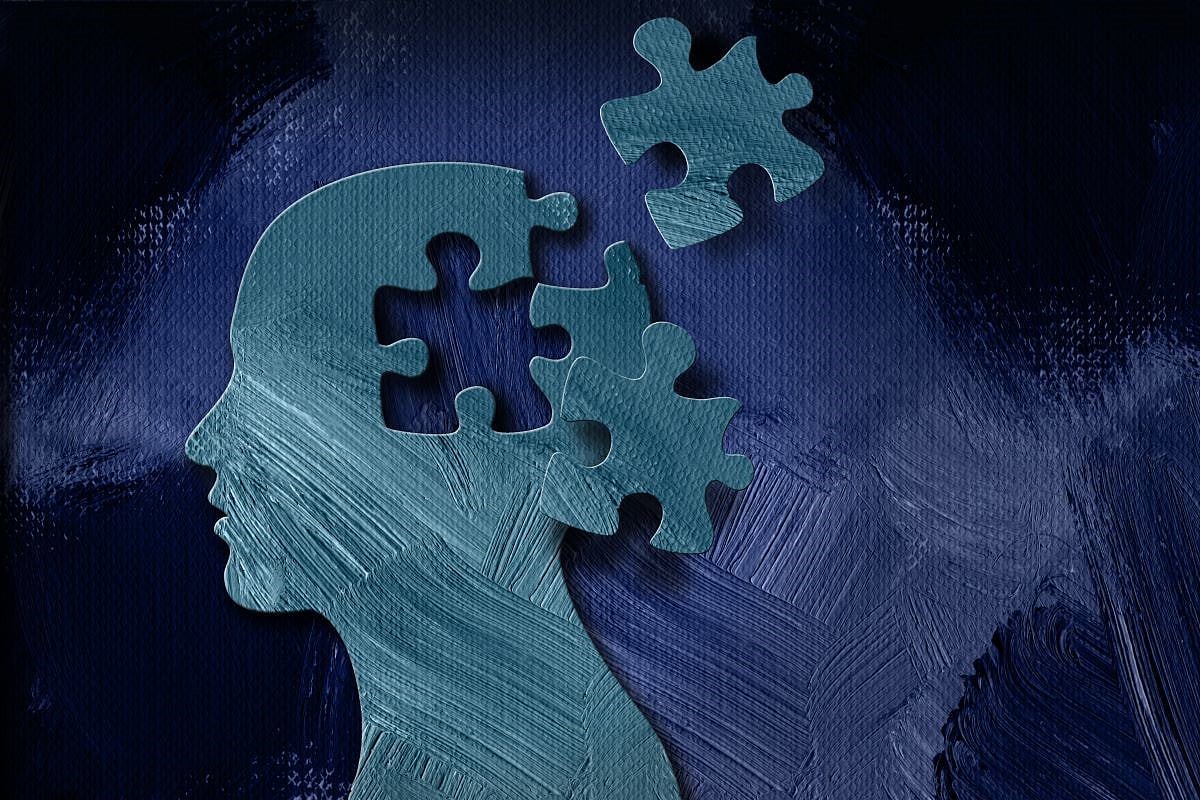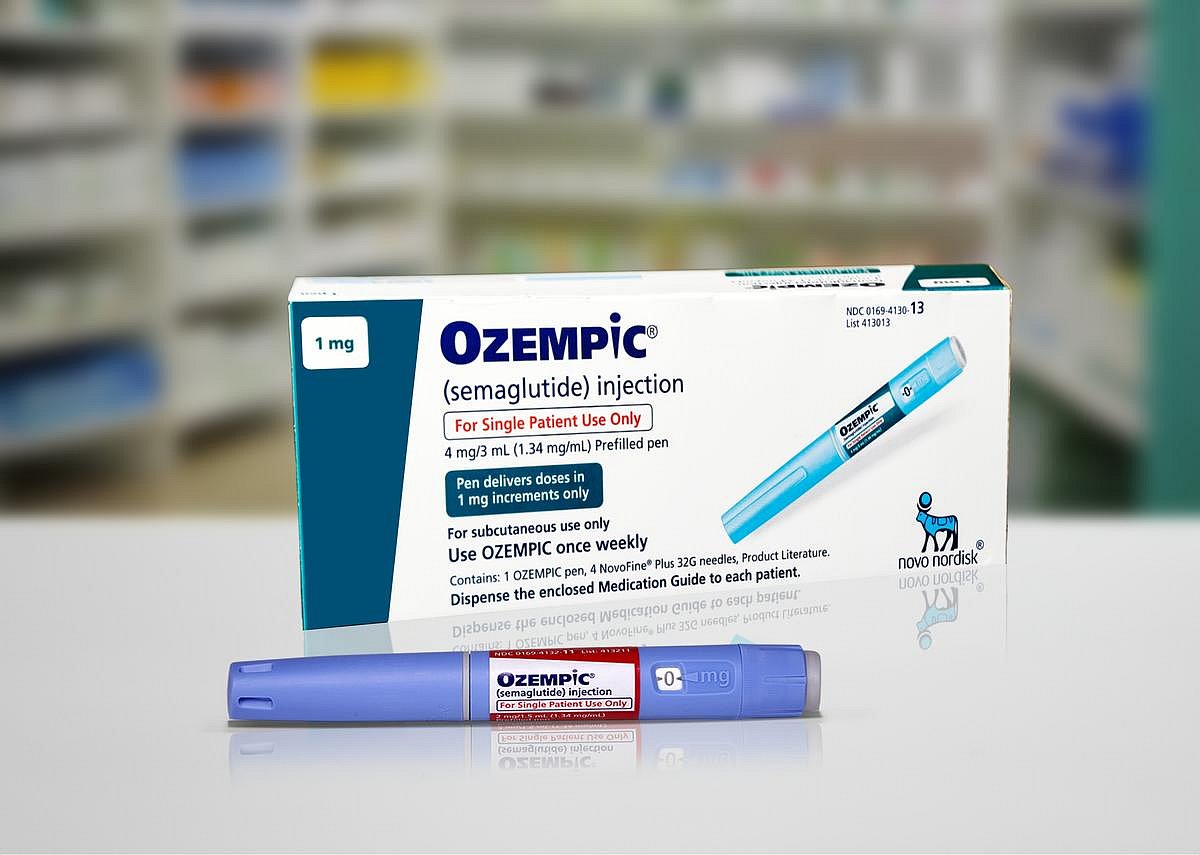Get Healthy!
Results for search "Alzheimer's".
29 Apr
Would You Want to Know If You Had Alzheimer’s Disease Before Having Symptoms?
More than 7 million U.S. adults are now living with Alzheimer’s, according to a new report from the Alzheimer's Association.
Health News Results - 279
Researchers say changes in folks' driving patterns could be an early signal of cognitive decline.
“We found that using a GPS data tracking device, we could more accurately determine who had developed cognitive issues than looking at just factors such as age, cognitive test scores and whether they had a genetic risk factor related to
High-tech neuroimaging of pro boxers and mixed martial arts (MMA) fighters is revealing potential damage to a system the brain uses to rid itself of waste.
“When this system doesn’t work properly, damaging proteins can accumulate, which have been linked to Alzheimer’s and other forms of dementia,” explained study lead author
A pill version of semaglutide, the ingredient in Ozempic and Wegovy, did not slow the progress of Alzheimer’s disea...
- I. Edwards HealthDay Reporter
- |
- November 25, 2025
- |
- Full Page
Getting in more daily steps may help slow early brain changes linked to Alzheimer’s disease, a new long-term study suggests.
Researchers followed nearly 300 older adults for up to 14 years and found that people who already showed high levels of b...
- I. Edwards HealthDay Reporter
- |
- November 4, 2025
- |
- Full Page
The U.S. Food and Drug Administration (FDA) has cleared another blood test that could help doctors identify whether a patient’s memory problems are likely caused by Alzheimer’s disease.
The new test, called Elecsys pTau181, was developed by...
- I. Edwards HealthDay Reporter
- |
- October 15, 2025
- |
- Full Page
Just like their human counterparts, cats may act cranky or confused and have trouble sleeping as they age.
They may even yowl more than usual at night.
These, researchers say, are dementia-like behaviors that may owe to an accumulation of plaques in their brain, just like those in people with
Two years’ involvement in programs focused on healthy eating, regular exercise and “brain training” exercises appears to have helped a wide range of older adults — even those at heightened risk for Alzheimer’s — avoid cogn...
- HealthDay Reporter
- Ernie Mundell
- |
- July 30, 2025
- |
- Full Page
About 90,000 people are diagnosed with Parkinson’s disease (PD) each year – one person every six minutes. While most people associate PD with tremors and stiffness, the condition is far more complex than these symptoms and may affect more than just movement.
An estimated 1 million people in the United States are living with this disease, according to the
From slurping daily spoonfuls of fish oil to giving up alcohol, lifting weights and playing word games, older Americans think just about anything that might keep their brains sharp is worth a try.
After all, the risk of dementia -- a loss of memory, problem-solving and thinking abilities that often equals an end to independence -- rises sharply with age. By itself, the most common dementi...
- HealthDay Reporter
- Carole Tanzer Miller
- |
- April 12, 2025
- |
- Full Page
Love doesn't fade when one member of a family develops Alzheimer's disease, but times of intimacy like Valentine's Day can become tougher.
Experts at the Alzheimer's Foundation of America (AFA) acknowledge that a loved one living with dementia can have trouble expressing their feelings or remembering things as they did in the past.
However, if partners and families follow the ...
- HealthDay Reporter
- Ernie Mundell
- |
- February 13, 2025
- |
- Full Page
Many elderly people and their caregivers don’t know a doctor has diagnosed them with dementia.
More than three-quarters of patients with dementia were not aware of their diagnosis, according to results recently published in the Journal of General Internal Medicine.
It’s not because the pe...
- HealthDay Reporter
- Dennis Thompson
- |
- January 21, 2025
- |
- Full Page
Seniors’ risk of dementia is more than double what was previously thought.
The risk of developing dementia after age 55 is more than 42% among Americans, researchers reported in a study published Jan. 13 in the journal Nature Medicine.
That’s more than twice the risk reported by older studies.
<...- HealthDay Reporter
- Dennis Thompson
- |
- January 14, 2025
- |
- Full Page
Some brain cells are more susceptible to the ravages of aging than others, a new mouse study has found.
These results could shed new light on why people’s risk for dementia, Alzheimer’s disease and other brain disorders increase with age, r...
- HealthDay Reporter
- Dennis Thompson
- |
- January 3, 2025
- |
- Full Page
Add Alzheimer’s disease to the list of conditions that might benefit from the revolutionary diabetes drug Ozempic, a new study says.
People with type 2 diabetes taking semaglutide appeared to have a significantly lower risk of developing Alzheimer’s compared to patients taking seven other diabetes drugs, researchers reported...
- HealthDay Reporter
- Dennis Thompson
- |
- October 24, 2024
- |
- Full Page
Older people who avail themselves of the newest shingles vaccine could reap a hidden benefit: A significant drop in their odds of developing dementia.
One expert applauded the new findings.
"Dementia isn’t an inevitable part of aging; it’s caused by diseases like Alzheimer’s," said
Finding yourself packing on the pounds around your waist and arms? If so, you might be at heightened risk for neurological illnesses like Alzheimer's or Parkinson's, new research suggests.
There was one other physical characteristic that lowered the odds, however: muscle strength. Stronger ...
- HealthDay Reporter
- Ernie Mundell
- |
- July 25, 2024
- |
- Full Page
After helping America through one of its worst tragedies, some responders to the events of 9/11 may now face another foe: Heightened risks for dementia.
A new study looks at the health of thousands of firemen, construction workers and others who worked at the World Trade Center (WTC) si...
- HealthDay Reporter
- Ernie Mundell
- |
- June 12, 2024
- |
- Full Page
Higher rates of blood vessel-damaging conditions like hypertension or diabetes may be driving up rates of cognitive decline and dementia among older American Indians, new research shows.
The study found that 54% of American Indians ages 72 to 95 had some form of impairment in their thinking and/or memory skills, while 10% had dementia.
The underlying causes: Vascular (blood vessel)...
- HealthDay Reporter
- Ernie Mundell
- |
- May 16, 2024
- |
- Full Page
Climate change is likely to make brain conditions like stroke, migraine, Alzheimer's disease, epilepsy and multiple sclerosis even worse, a new review warns.
The potential effects of a changing climate is likely to be substantial on a range of neurological conditions, researche...
- HealthDay Reporter
- Dennis Thompson
- |
- May 16, 2024
- |
- Full Page
Lucid episodes are an unexpected occurrence among people with late-stage Alzheimer's disease and related dementias.
But these spontaneous events -- in which a person temporarily regains an ability to communicate that appeared to be permanently lost -- are not always a sign of impending death, a recent study argues.
Half the time, people live more than six months following their luci...
- HealthDay Reporter
- Dennis Thompson
- |
- April 15, 2024
- |
- Full Page
The discovery of a gene variant that rids the brain of toxic plaques linked to Alzheimer's might lead to new treatments for the disease, researchers report.
The variant arises naturally in people who don't seem to get Alzheimer's disease despite having another gene, called APOEe4, that strongly prom...
- HealthDay Reporter
- Ernie Mundell
- |
- April 11, 2024
- |
- Full Page
Nearly 7 million American seniors are living with Alzheimer's dementia, placing a huge strain on both personal caregivers and the U.S. health care system, according to a new Alzheimer's Association report.
The cost of caring for seniors with Alzheimer's is projected to reach $360 billion this year, up $15 billion from just a year ago, says the association's
Doctors looking to help their patients head off dementia may want to ask for their address.
An international team of researchers has linked accelerated brain aging and a higher risk of thinking declines to living in a poorer neighborhood.
"If you want to prevent dementia, and you're not asking someone about their neighborhood, you're missing information that's important to kno...
- HealthDay Reporter
- Carole Tanzer Miller
- |
- March 15, 2024
- |
- Full Page
Combat veterans who suffered traumatic brain injuries due to explosive blasts may have markers in their spinal fluid similar to those of Alzheimer's disease, new research finds.
"Previous research has shown that moderate to severe traumatic brain injuries may increase a person's risk of Alzheimer's disease," said senior study author
Instead of approving the new Alzheimer's drug donanemab this month, as was expected, the U.S. Food and Drug Administration will now require the experimental medication be scrutinized more closely by an expert panel, the drug's maker said Friday.
"The FDA has informed Lilly it wants to further understand topics related to evaluating the safety and efficacy of donanemab, including the safet...
- HealthDay Reporter
- Robin Foster
- |
- March 8, 2024
- |
- Full Page
In a new study, yoga appears to have bolstered the brain health of older women who had risk factors for Alzheimer's disease.
The study can't prove that the ancient practice will slow or prevent the onset of Alzheimer's, but it did seem to reverse some forms of neurological decline, researchers said.
"That is what yoga is good for -- to reduce stress, to improve brain health, subject...
- HealthDay Reporter
- Ernie Mundell
- |
- February 28, 2024
- |
- Full Page
Excess fat around your pancreas could bode ill for the health of your aging brain, new research shows.
But maybe only if you're male: The relationship wasn't observed among women, noted the team from Rutgers University in New Brunswick, N.J.
"In middle-aged males at high Alzheimer's disease risk -- but not females --higher pancreatic fat was associated with lower cognition and brain...
- HealthDay Reporter
- Ernie Mundell
- |
- February 27, 2024
- |
- Full Page
People exposed to high levels of traffic-related air pollution are more likely to have more amyloid plaques in their brain, a condition associated with Alzheimer's disease, a new study finds.
Seniors were nearly twice as likely to have more amyloid plaques if, in the year before their death, they lived in places with high concentrations of particle pollution caused by traffic, results sho...
- HealthDay Reporter
- Dennis Thompson
- |
- February 22, 2024
- |
- Full Page
Could drugs that give a boost to men's sexual performance help them stave off Alzheimer's disease?
That's the main finding from a study suggesting that erectile dysfunction meds like Cialis, Levitra and Viagra might lower the odds for the memory-robbing illness.
The study wasn't designed to prove cause-and-effect, cautioned British researchers at University College London.
"Mo...
- HealthDay Reporter
- Ernie Mundell
- |
- February 8, 2024
- |
- Full Page
New research suggests healthy lifestyles can help stave off dementia, perhaps by building a resilient 'cognitive reserve' in the aging brain.
The study was based on the brain autopsies on 586 people who lived to an average of almost 91. Researchers compared each person's lifestyle and end-of-life mental skills to their neurological signs of dementia, such as brain protein plaques or chang...
- HealthDay Reporter
- Ernie Mundell
- |
- February 5, 2024
- |
- Full Page
Dementia seems like a disorder that's always haunted the human race.
But this form of severe memory loss is actually a modern malady, if classical Greek and Roman physicians are to be believed.
A new analysis of ancient Greek and Roman medical texts suggests that dementia was extremely rare 2,000 to 2,500 years ago, in the time of Aristotle, Galen and Pliny the Elder.
The new ...
- HealthDay Reporter
- Dennis Thompson
- |
- February 2, 2024
- |
- Full Page
Biogen, maker of the Alzheimer's medicine Aduhelm, announced Wednesday that it would "discontinue the development and commercialization" of the controversial drug.
Biogen will return the rights to Aduhelm to Neurimmune, the private firm that invented it, the company said in a
Five of eight British children who received human growth hormone from the pituitary glands of deceased donors went on to develop early-onset Alzheimer's disease many decades later, researchers report.
Researchers at University College London (UCL) suspect that the growth hormone received by these people in childhood may have contained amyloid-beta protein plaques, which build up in the br...
- HealthDay Reporter
- Ernie Mundell
- |
- January 29, 2024
- |
- Full Page
Strange visual disturbances occur early in about 10% of Alzheimer's cases, and when this happens it almost always signals the impending arrival of the disease, a new study finds.
The condition is called posterior cortical atrophy (PCA). It involves a sudden difficulty in performing vision-related tasks -- for example writing, judging whether an object is moving or stationary, or easily pi...
- HealthDay Reporter
- Ernie Mundell
- |
- January 24, 2024
- |
- Full Page
A daily multivitamin could help people keep their brains healthy as they age, a new trial finds.
Results suggest taking multivitamins could help prevent memory loss and slow cognitive aging among older adults, researchers report in the Jan. 18 issue of the American Journal of Clinical Nutritio...
- HealthDay Reporter
- Dennis Thompson
- |
- January 18, 2024
- |
- Full Page
There are so many New Year's resolutions from which to choose, but an important one could be to schedule a memory screening, experts say.
Memory screenings consist of a series of questions that gauge memory and brain function, according to the Alzheimer's Foundation of America (AFA).
These regular screenings are an important way to detect memory problems early, and should be part of...
- HealthDay Reporter
- Dennis Thompson
- |
- January 3, 2024
- |
- Full Page
From alcohol use to social isolation, poor hearing and heart disease, researchers have identified more than a dozen non-genetic factors that up the risk of dementia for people under 65.
Though about 370,000 new cases a year of young-onset dementia are diagnosed worldwide, it hasn't been well-researched.
Now, a large study from scientists in the U.K. and the Netherlands suggests that...
- HealthDay Reporter
- Carole Tanzer Miller
- |
- December 29, 2023
- |
- Full Page
A common stomach bug may play a part in Alzheimer's disease risk.
New research found that older folks infected with Helicobacter pylori (H. pylori) had greater odds for developing Alzheimer's, the most common type of dementia.
"Given the global aging population, dementia numbers are expected to triple in the next 40 years," said study co-author
In preliminary findings, Swedish researchers say taking a cholesterol-lowering statin could also slow the progression of Alzheimer's disease.
The study can't prove cause-and-effect, but might pave the way to a trial that could confirm such a link, said study author Sara Garcia-Ptacek, an associate professor of neuroscience at the Ka...
- HealthDay Reporter
- Ernie Mundell
- |
- December 28, 2023
- |
- Full Page
For the growing number of American seniors who live alone, having a beloved dog or cat by their side could help them maintain a healthy brain.
New research on more than 7,900 people averaging 66 years of age found that those who lived alone were able to stave off losses in memory and thinking if they had a pet.
Pet ownership didn't seem to affect the cognition of older folks who liv...
- HealthDay Reporter
- Ernie Mundell
- |
- December 27, 2023
- |
- Full Page
Are you necessarily at higher risk of Alzheimer's disease just because you're 80, and not 75? New research shows it's more complex than that.
The findings suggest that it's the pace of buildup in the brain of Alzheimer's-linked amyloid protein plaques that matters most, not age.
"Our findings are consistent with studies showing that the amyloid accumulation in the brain takes decade...
- HealthDay Reporter
- Ernie Mundell
- |
- December 26, 2023
- |
- Full Page
A study involving twins suggests that if you have a sibling who develops dementia, that might not bode well for your life span.
That's true even if you don't go on to develop dementia yourself, according to a study from U.S. and Swedish researchers.
One investigator was surprised by the finding.
"We expected a different result. We expected that, in twins where one developed de...
- HealthDay Reporter
- Ernie Mundell
- |
- December 12, 2023
- |
- Full Page
Loss of the "happiness"brain hormone serotonin might play a role in the decline of brain function as a person ages, a new study reports.
People with mild cognitive impairment (MCI) had up to 25% lower levels of serotonin than healthy people in key regions of the brain associated with memory, problem-solving and emotion, researchers reported recently in the
When an HIV-infected child known as the 'Mississippi baby' was given powerful antiretroviral drugs within hours of birth in 2013 and then appeared to be rid of HIV, people wondered if it might be replicated in other newborns.
An international study involving 54 babies suggests it can.
Researchers now believe that if HIV-infected newborns receive antiretroviral therapy (ART) within t...
- HealthDay Reporter
- Ernie Mundell
- |
- December 11, 2023
- |
- Full Page
Minding your heart health when you're young could spare your brain from dementia decades later, new research confirms.
Chinese researchers looked at data on more than 450,000 older Britons. They found that people who'd already been in poor cardiovascular health before they reached the age of 45 had a 25% higher odds of developing dementia, compared to those with better heart heath.
...
- HealthDay Reporter
- Ernie Mundell
- |
- November 30, 2023
- |
- Full Page
Alzheimer's patients are notoriously irritable, agitated and anxious -- and researchers now think they know why.
Brain inflammation appears to influence the mood problems of Alzheimer's patients, rather than traditional markers of the disease like amyloid beta or tau proteins, researchers report in the Nov. 27 issue of the journal
Medical imaging for thinking and memory issues happens much later in Black patients than in their white and Hispanic counterparts, new research shows.
A study to be presented Thursday at a meeting of radiologists also revealed that Black patients were less ofte...
- HealthDay Reporter
- Carole Tanzer Miller
- |
- November 28, 2023
- |
- Full Page
Whole grains could be the key to Black people protecting their brains against aging and dementia, a new study reports.
Black folks who ate more foods with whole grains appeared to have a slower rate of memory decline than those who ate fewer whole grains, according to findings published Nov. 23 in the journal Neurology.
Among Black people, those who ate the most whole grain...
- HealthDay Reporter
- Dennis Thompson
- |
- November 27, 2023
- |
- Full Page
MONDAY, Nov. 27, 2023 (HeathDay News) -- More female surgeons are entering the field, which brings up a new question: Are your surgical outcomes likely to be better if your gender matches that of your surgeon?
The answer seems to be "probably not."
A study from University of California Los Angeles researchers found little evidence that patient-surgeon "gender concordance" matters to...
- HealthDay Reporter
- Ernie Mundell
- |
- November 27, 2023
- |
- Full Page
Middle-aged folks with lots of belly fat surrounding their internal organs appear to be at higher risk for Alzheimer's disease later in life, a new study suggests.
This hidden abdominal fat -- known as visceral fat -- is related to changes in the brain up to 15 years before the earliest symptoms of Alzheimer's manifest, according to findings to be presented at next week's annual meeting o...
- HealthDay Reporter
- Dennis Thompson
- |
- November 20, 2023
- |
- Full Page





















































